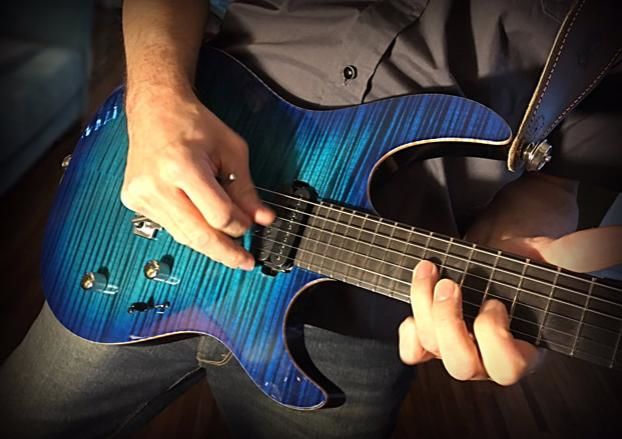Learn the Hammer-On Chord Triplet
All the latest guitar news, interviews, lessons, reviews, deals and more, direct to your inbox!
You are now subscribed
Your newsletter sign-up was successful

Triplets are awesome. We’ve talked before about the power of three and why you should work triplets into your own playing. You hear triplets a lot in solos, especially by shred masters like Van Halen (“Eruption”), Steve Vai (“Shy Boy”) and Dimebag Darrell (“Cowboys from Hell”). But it’s rare to hear triplets in rhythm guitar. For one, playing triplets for rhythm guitar is hard when playing in a 4/4-time signature, which most rock and roll uses. Indeed, the only rock song with a triplet rhythm that I could readily find was by The Beatles. During “All My Loving,” George Harrison delivers a steady barrage of triplets throughout the verses and somehow manages to keep time.
The other issue with mixing triplets into your rhythm guitar work is that hitting chords that fast can be a difficult task. If you are used to picking down/up/down, once you complete the triplet pattern you would have to start the next pattern on an upstroke, which can mess up the rhythm for even the most experienced guitar player. To solve this problem, you can deliver all your triplets with downstrokes. This can make for a tired forearm so try to stay relaxed if you choose this technique. Another option is to—after every down/up/down rotation—start again. So, if executing two measures of triplets in a row, your picking strokes would be down/up/down/down/up/down.
But there is another option, one which appears to be more advanced but—if you have the finger strength and the necessary knowledge of note combinations to do it—will give you the ability to deliver interesting triplet chord progressions, with perfect timing, all over the fretboard.
Enter the hammer-on chord triplet. We all know how the hammer-on works: you forcefully bring your fretting hand finger down on the note you want to play. Hammer-on hard enough and the note will ring even if you don’t pick it. This is the opposite of the pull-off. If you pick the first note of your triplet and let your fretting hand fingers hammer-on notes two and three, you can execute the entire triplet with one pick stroke. Do this on more than one string—knowing that the corresponding notes you hammer-on to will form the chords you want—and voila, you have just performed a hammer-on chord triplet. And you’ve done it with one picking action, which means you’re ready for anything to come with no fears of losing time.
Here's how to get started: Bar the 7th fret on the 4th and 3rd strings with your index finger. These two notes together are A and D, which is a two note D chord. Pick the D and G strings, and without moving your index finger hammer down on the 9th fret on the 4th string. This is an E note which, combined with the A note your index finger is still holding, creates a two note A chord. Now, hammer down on the 11th fret with your pinky. This is a G-flat which, when combined with an A, creates a G-flat minor chord. If you successfully hit all three chords in rhythm with one picking action at the start you will create a hammer-on chord triplet for the chords D, A and G-flat minor. Repeat this same pattern on the 5th and 4th strings (still starting on the 7 fret) and you will play A, E and D flat major. Move down a full step and the chords will be G, D and B and so on.
I use this technique to play four sets of hammer-on triplet chords in a row in the verses of the Stone Mob song “Dangerous.” It’s easier than you think and it can make for some very unique rhythms. Watch the video for “Dangerous” and then the accompanying instructional video. I’ll show you this Jedi guitar trick and the force of the hammer-on chord triplet will be yours!
All the latest guitar news, interviews, lessons, reviews, deals and more, direct to your inbox!
